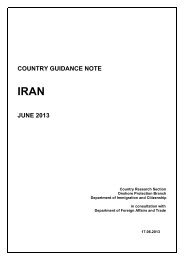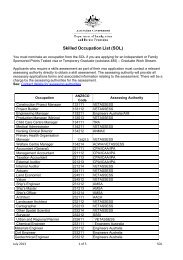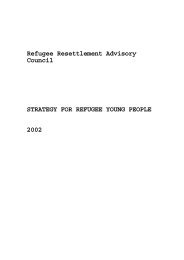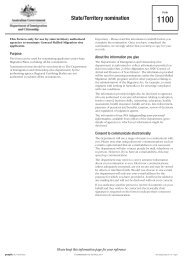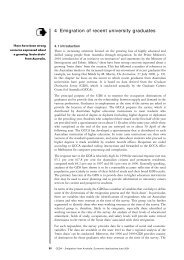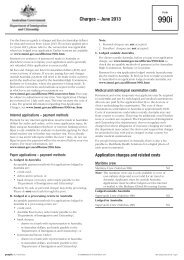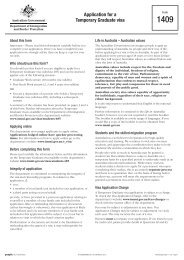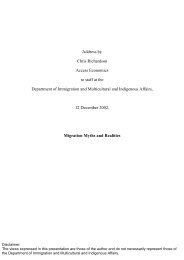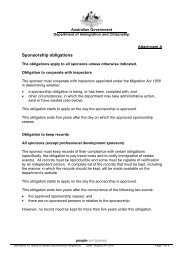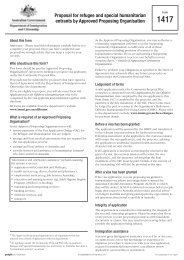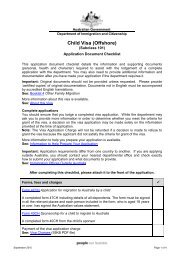Evaluation of the Integrated Humanitarian Settlement Strategy (IHSS)
Evaluation of the Integrated Humanitarian Settlement Strategy (IHSS)
Evaluation of the Integrated Humanitarian Settlement Strategy (IHSS)
You also want an ePaper? Increase the reach of your titles
YUMPU automatically turns print PDFs into web optimized ePapers that Google loves.
Executive summary<br />
Introduction<br />
The Commonwealth Department <strong>of</strong><br />
Immigration and Multicultural and Indigenous<br />
Affairs (DIMIA) and <strong>the</strong> Commonwealth<br />
Department <strong>of</strong> Health and Ageing (DHA)<br />
commissioned Urbis Keys Young to carry out<br />
a combined evaluation <strong>of</strong> <strong>the</strong> <strong>Integrated</strong><br />
<strong>Humanitarian</strong> <strong>Settlement</strong> <strong>Strategy</strong> (<strong>IHSS</strong>) and<br />
<strong>of</strong> Commonwealth funded services for<br />
survivors <strong>of</strong> torture and trauma.<br />
The purpose <strong>of</strong> <strong>the</strong> evaluation was to review<br />
<strong>the</strong> services to provide better information for<br />
future development including funding.<br />
Specifically <strong>the</strong> evaluation was to:<br />
The evaluation has identified a number <strong>of</strong><br />
positive outcomes achieved by <strong>IHSS</strong> services<br />
over <strong>the</strong>ir initial years <strong>of</strong> operation. These are<br />
as follows:<br />
<br />
<br />
<br />
<br />
There is increased equity in service<br />
provision – most eligible entrants are<br />
consistently receiving at least a core set <strong>of</strong><br />
services.<br />
Timely provision <strong>of</strong> service – eligible<br />
entrants begin to receive <strong>the</strong>se services<br />
from <strong>the</strong> moment <strong>the</strong>y arrive in Australia<br />
and throughout <strong>the</strong>ir initial settlement<br />
phase.<br />
Basic support needs are being met and<br />
few major gaps have been identified.<br />
There is a very high level <strong>of</strong> satisfaction<br />
among clients.<br />
<br />
assess whe<strong>the</strong>r services are meeting <strong>the</strong>ir<br />
objectives and whe<strong>the</strong>r <strong>the</strong>re are any<br />
gaps, omissions or duplications.<br />
<br />
There is evidence <strong>of</strong> increased<br />
pr<strong>of</strong>essionalism in <strong>the</strong> way services are<br />
delivered.<br />
<br />
<br />
identify any modifications necessary to<br />
deliver services to clients in a more<br />
efficient, effective and equitable manner.<br />
assess <strong>the</strong> extent to which services to<br />
survivors <strong>of</strong> torture and trauma funded by<br />
<strong>the</strong> Commonwealth Government are<br />
meeting client needs in accordance with<br />
<strong>the</strong> principles and standards stated in <strong>the</strong><br />
relevant contracts and funding agreements<br />
between DIMIA, DHA and <strong>the</strong> Forum <strong>of</strong><br />
Australian Services for <strong>the</strong> Survivors <strong>of</strong><br />
Torture and Trauma.<br />
provide practical and implementable<br />
recommendations to improve service<br />
delivery for all aspects <strong>of</strong> <strong>the</strong> services.<br />
The evaluation involved an extensive<br />
consultation process with <strong>the</strong> two<br />
Departments; clients <strong>of</strong> <strong>the</strong> services; service<br />
providers and a range <strong>of</strong> o<strong>the</strong>r stakeholders as<br />
well as a review <strong>of</strong> background data and<br />
documentation and an evaluation website with<br />
<strong>the</strong> capacity to receive submissions.<br />
Details <strong>of</strong> <strong>the</strong> methodology for <strong>the</strong> evaluation<br />
are at Appendix A.<br />
<br />
The delivery <strong>of</strong> services is consistent with<br />
stated <strong>IHSS</strong> principles.<br />
Reliance on a sole provider and <strong>the</strong><br />
potential for client dependency has been<br />
reduced.<br />
The evaluation has also identified a number <strong>of</strong><br />
general areas requiring attention in future<br />
development <strong>of</strong> <strong>the</strong> <strong>IHSS</strong>.<br />
<br />
<br />
While overall client needs have been met,<br />
<strong>the</strong>re is a lack <strong>of</strong> common understanding<br />
<strong>of</strong> what constitutes initial settlement<br />
needs, how much service is appropriate<br />
and when and how clients should be<br />
referred to o<strong>the</strong>r <strong>IHSS</strong> and non <strong>IHSS</strong><br />
agencies. There are also some gaps in<br />
<strong>the</strong> model, for example relating to how<br />
urgent physical health needs are<br />
addressed in <strong>the</strong> first two weeks after an<br />
entrant’s arrival. Finally, <strong>the</strong>re is some<br />
evidence that recent arrivals may have<br />
higher support needs than previous<br />
groups.<br />
Integration <strong>of</strong> <strong>the</strong> <strong>IHSS</strong> services has, in<br />
many instances, been inadequate and <strong>the</strong><br />
divisions between agencies have created<br />
silos that affect smooth and efficient<br />
<strong>Evaluation</strong> <strong>of</strong> <strong>the</strong> <strong>Integrated</strong> <strong>Humanitarian</strong> <strong>Settlement</strong> <strong>Strategy</strong> 27 May 2003<br />
i



